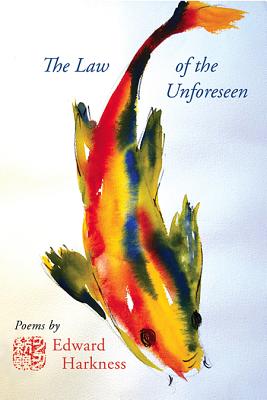Whatcha Reading, Ed Harkness?
Every week we ask an interesting figure what they're digging into. Have ideas who we should reach out to? Let it fly: info@seattlereviewofbooks.com. Want to read more? Check out the archives.

Ed Harkness is Shoreline-based author of three full-length poetry volumes. His most recent, The Law of the Unforeseen was released in 2018 by Pleasure Boat Studio. our Poet in Residence for August. To the date of this writing, we've published three of his poems: Unable to Waken, Tying a Tie, and Kite, Kaloch Beach.

What are you reading now?
I'm reading several new books by northwest poets. The first is Jed Myers' The Marriage of Space and Time (MoonPath Press, 2019), a wonderful collection whose title plays off the 18th century poet William Blake's The Marriage of Heaven and Hell. The poems in Myers' book bridge various kinds of experiences — specific moments in time with more expansive reflections that widen outward in both time and space. My description makes the poems sound abstract, like theoretical physics or Einstein's Second Theory of Relativity. Myers' poems are anything but abstract. They are vivid, always lucid, always moving, as in "Two Men Saying Goodbye," about a son's visits with his father during the father's last days in the hospital. That poem had me in tears at the end.
Another book I'm diving into is Bethany Reid's Body My House (Goldfish Press, 2018). Reid's poems, like Myers', are the works of a mature poet looking squarely at the world, at the aging body, the beautiful — and sometimes unbeautiful — complications of marriage, of being a parent, of being a woman in a world not always friendly to women. A favorite of mine is "Contract With the Body," a poem that begins with "Today I chronicle the pleasures / of the body." It's funny and serious. Some of these "pleasures" include headaches, stubbed toes, the broken car heater, a mammogram. All are, as the speaker says, "evidence of breath," and therefore, cause for celebration. I adore this book.
What did you read last?
This may come as a surprise to SRoB readers. I just read, for the first time (please, no gasps of disbelief), Charlotte Brontë's 1847 novel, Jane Eyre. Not only read it, but read it aloud, to my wife, over about a 6-month span of various long car trip. I tried — and failed miserably — to affect English accents for the novel's various characters. Now, finally, I know what all the fuss is about, why millions of readers have fallen hard for Jane, our feisty young heroine, endured with her and the degradations, upheavals and loves she experiences over several decades of her life. Brontë's language is so rich, her first person narrative so vivid and, at times, heartrending, her descriptions so powerful in pulling the reader into Jane's world, I found myself saying to my wife, not once but several times, and only half in jest, "Why, after Jane Eyre, would anyone even try to write another novel?"
What are you reading next?
Next up for me is a book by another Washington State poet, Derek Sheffield, who teaches at Wenatchee College and is an editor for Terrain.org. Sheffield's book, Through the Second Skin (Orchises Press, 2013) is a new acquisition. I'm familiar with Sheffield's work and am a committed fan. If readers can get their hands on a Sheffield poem called "Song of the Lark," they will know why I hold Sheffield in huge regard.
And waiting is a new collection by much-loved northwest poet, Tess Gallagher, called Is, Is Not. Gallagher lives half the year in her hometown of Port Angeles, and the other half in Ireland. She's a writer of international stature. The Pulitzer Prize-winning poet, Theodore Roethke, who taught verse writing at the University of Washington, had many students who later went on to illustrious writing careers. Among them were poets Richard Hugo, Carolyn Kizer, James Wright and...Tess Gallagher. Tess took one of the last classes Roethke taught before his death in 1964.